The Genocide Convention, which South Africa and many other countries are signatories to, defines genocide as acts committed with intent to destroy, in whole or in part, a national, ethnical, racial, or religious group.
These acts include killing members of the group, causing serious bodily or mental harm, imposing conditions leading to physical destruction, preventing births within the group, or forcibly transferring children from one group to another.
The convention places a duty on signatory states to both prevent and punish genocide, which is what South Africa is doing.
In a historic and highly contentious case at the International Court of Justice (ICJ), South Africa has accused Israel of committing genocide in the Gaza Strip.
The case, filed in December, centres on the deadly conflict in Gaza that began on October 7 2023, when Hamas, a Palestinian militant group, launched attacks on Israel.
The conflict has resulted in a significant loss of life and widespread devastation.
South Africa’s legal team at the ICJ argued that Israel’s military attack on Gaza exhibited genocidal intent.
Incitement of violence
They pointed to several pieces of evidence, including statements made by Israeli political leaders and military commanders that were seen as incitement to violence.
In court Tembeka Ngcukaitobi, one of the lawyers for South Africa, pointed to what is perceived as Israel’s aggressive military tactics that have resulted in significant destruction of civilian infrastructure and homes in Gaza.
He argued that Israel’s political leaders and military commanders have made statements indicating harmful intent towards the Palestinians.
“Israel’s political leaders, military commanders and persons holding official positions have systematically and in explicit terms declared their genocidal intent,” Ngcukaitobi argued.
“These statements are then repeated by soldiers on the ground in Gaza as they engage in the destruction of Palestinians and the physical infrastructure of Gaza.”
One key piece of evidence presented was a statement made by Israeli Prime Minister Benjamin Netanyahu in October 2023, in which he referenced a Biblical command related to the destruction of a group of people.
The statement, “remember what Amalek has done to you”, was interpreted by many as a genocidal invocation.
The South African legal team also highlighted concerning rhetoric within the Israeli Knesset, where some members have expressed desires for the destruction of Gaza and shown little sympathy for Gazans.
Some even suggested extreme measures, such as the use of nuclear weapons, and used dehumanising language towards Gazans.
Destruction articulated state policy
Said Ngcukaitobi: “Soldiers believe that this language and their actions are acceptable because the destruction of Palestinian life in Gaza is articulated state policy.
“Senior political and military officials encouraged without censure the 95-year-old Israeli army reservist Ezra Yahin, a veteran of the Deir Yassin massacre against the Palestinians in 1948, to speak to the soldiers ahead of the ground invasion in Gaza.
“In his talk, he echoed the same sentiment while being driven around in an Israeli army vehicle, dressed in Israeli army fatigue: ‘Be triumphant and finish them off and don’t leave anyone behind.
“Erase the memory of them. Erase them, their families, mothers and children. These animals can no longer live. If you have an Arab neighbour, don’t wait, go to his home and shoot him. We want to invade, not like before. We want to enter and destroy what’s in front of us.
“Destroy houses, then destroy the one after it with all of our forces, complete destruction. Enter and destroy’.”
Professor Max du Plessis, another lawyer representing South Africa, stressed the importance of recognising the rights of Palestinians in Gaza to exist and emphasised that Israel’s actions should not be seen as a mere conflict but as destructive actions by an occupying power.
Du Plessis argued that Israel has operated outside the bounds of international law for an extended period.
The South African representatives also drew attention to the dire humanitarian situation in Gaza, including the spread of infectious diseases and concerning statistics highlighting the suffering of the Palestinian people.
They called for immediate measures to protect Palestinians in Gaza from further harm.
Dire humanitarian situation
The case presented by South Africa also emphasised the dire humanitarian situation in Gaza.
The legal team cited statistics that demonstrated the high number of casualties including children and civilians, as well as the deteriorating healthcare system and the risk of infectious diseases spreading.
It argued that Israel’s actions in Gaza constituted not one but two genocidal acts: mass killings and the infliction of serious bodily or mental harm on Palestinians in Gaza.
The team contended that Israel had failed to prevent or punish these acts as required by the Genocide Convention.
The case continues on Friday with arguments from the Israeli representatives.
Doc.1_Convention on the Prevention and Punishment of the Crime of Genocide



